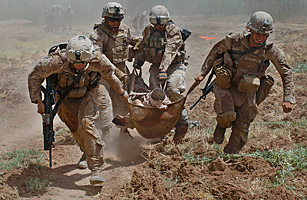
U.S. Marines carry a comrade wounded by an improvised explosive device to a waiting medevac helicopter, near Marjah in Helmand Province, August, 2010.
Ten years ago, American intelligence and military personnel went to war in Afghanistan to remove a government that refused to hand over terrorists who had successfully attacked the United States. The U.S. action was not simply one of retaliation; it was largely motivated by a desire to ensure that such attacks would not be repeated.
The goals of ousting the Taliban regime and ridding Afghanistan of most of the terrorists involved in the 9/11 hijackings were accomplished in short order. Nevertheless, American troops not only remained in Afghanistan but increased in number, ultimately reaching 100,000 under President Obama. The mission also expanded. U.S. soldiers fought not just the few terrorists they encountered but also the many Taliban who moved into and out of Afghanistan from bases in Pakistan. What began as a narrow, modest war of necessity evolved into a broad, ambitious war of choice.
It was a costly evolution. The Afghan war has claimed nearly 1,800 American lives and caused an additional 14,000 casualties. Direct costs are in the range of $400 billion and are increasing at the rate of $2 billion every week. It is only a matter of time before Afghanistan overtakes Vietnam as the longest war in modern American history.
The aim of U.S. policy is to create a competent Afghan government backed by capable army and police forces who can prevail over the Taliban or persuade them to give up. Alas, neither goal is likely to be achieved, given Afghanistan's ethnic divisions, its tradition of a weak center and Pakistan's provision of a sanctuary to the Taliban, many of whom are determined to fight on.
A more realistic policy would seek to make sure Afghanistan does not again become a base for global terrorists. This could mostly be done with drones and a much smaller troop presence that does some advising and training and conducts raids along the lines of the recent operation that killed Osama bin Laden. The U.S. is on course to put such a policy in place by the end of 2014; it could do so much sooner without jeopardizing the final outcome.
What should we learn from this decade? Former Secretary of Defense Robert Gates was on to something when he stated that any of his successors who advise the President to again send a big American land army into Asia or the Middle East or Africa should have his head examined. It is not just that it promises to be too costly; it is also that the prospects for success are too small. Local realities matter. Nothing is more difficult than remaking another society. Except in the rarest cases, we should confine nation building to here at home, where it is sorely needed.
Haass is president of the Council on Foreign Relations